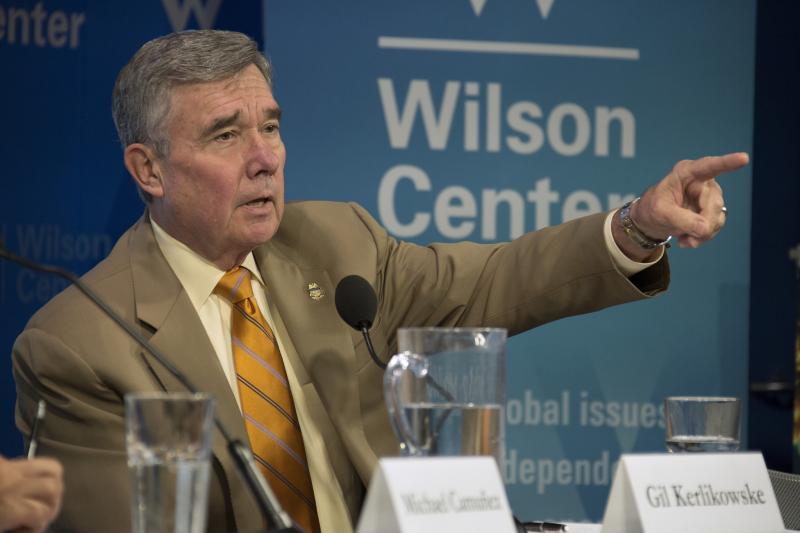CBP Commissioner R. Gil Kerlikowske declared that the U.S. and Mexico have made “great strides in strengthening our partnerships” to improve border management during remarks at a forum hosted by the Woodrow Wilson Center for International Scholars on June 15.
During an on-stage interview and Q&A session at the Building a Competitive U.S.-Mexico Border conference, Commissioner Kerlikowske said, “I was here a year ago and since then we’ve made much progress” building strong U.S.-Mexico economic ties and law enforcement relationships.

declared that the U.S. and Mexico have
made “great strides in strengthening our
partnerships” to improve border
management during remarks at a forum
hosted by the Woodrow Wilson Center
for International Scholars on June 15.
Much of that progress evolved from CBP programs that reduce the wait and cost of crossing the border and benefit both nations.
For example, more than 83,000 Mexican nationals are now enrolled in CBP’s Global Entry, a Trusted Traveler program that streamlines border crossings by prescreening travelers before entering the U.S. Another pilot program lets commercial truck drivers pay user fees online, reducing processing time at the ports and increasing profits for the trucking industry.
When asked how the agency helps build vibrant border economies, Commissioner Kerlikowske described the cargo pre-inspection process that allows Mexican customs officers to work in the U.S. and CBP officers to work in Mexico inspecting cargo before entering each country. Like Global Entry, the pilot program eliminates a second inspection, saving time and increasing profits for participating carriers.
A CBP-private sector partnership saves shippers time and warehouse storage expenses. The service allows shippers to compensate the Office of Field Operations for adding the workforce needed to process large or timely cargo deliveries. “It’s the cost of doing business,” the Commissioner said.
“This is part of CBP’s DNA. We’re open to new ideas,” he added.
An impressive $530 billion dollars in trade crosses the U.S.-Mexico border each year, an average of $1.45 billion per day. During 2015 there were over $235 billion in exports to Mexico and $296 billion in imports from Mexico, according to the U.S. Census Bureau.
Overall, the keys to building and maintaining a strong relationship with Mexico are trust and transparency, the Commissioner explained. He cited the joint teams of CBP and Mexican federal law enforcement personnel who patrol the border and the public forums held in Mexico and the U.S. The meetings, he said, build better understanding of the challenges as well as the progress both governments are making in protecting the border. At the same time, officials in attendance learn about issues important to the border populations.
“We’re open to questions on security from citizens on both sides of the border,” Commissioner Kerlikowske said.
Mexican and CBP personnel also share intelligence using encrypted networks and their scientists work together. “At the Matamoros [Mexico] crossing, Mexico X-rays trucks and gives us the images,” said the Commissioner, providing another example of this trusted partnership at work.
Questioned on future goals, the Commissioner said CBP is committed to hiring the 2,000 officers and agents appropriated by Congress. “Staffing shortages are significant. These are good jobs with benefits, but there are stringent requirements and training is rigorous,” he said.
Asked if the upcoming election could change the relationship between Mexico and the U.S., he said “officials in Mexico recognize the heat of the campaign. But I won’t be silent on issues that affect our relationship.” The Commissioner expressed confidence those principles—“trust, cooperation and transparency—supported on both sides of the aisle,” will remain no matter who wins the election.
“I don’t think we can have a warmer and trusting relationship than we have now,” Commissioner Kerlikowske added.


